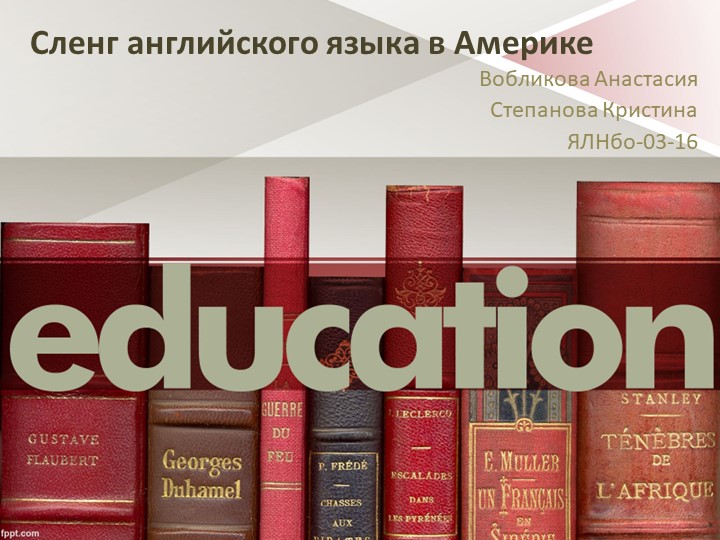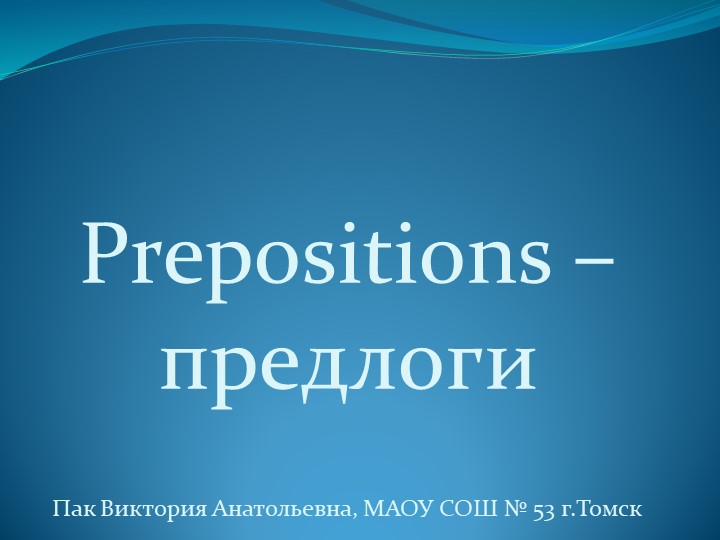Презентация - "Презентация "Наречия в английском языке""

- Презентации / Другие презентации
- 0
- 17.10.24
Просмотреть и скачать презентацию на тему "Презентация "Наречия в английском языке""
Сайт klass-uchebnik.com предлагает качественные учебные материалы для школьников, родителей и учителей. Здесь можно бесплатно читать и скачивать современные учебники, рабочие тетради, а также наглядные презентации по всем предметам школьной программы. Материалы распределены по классам и темам, что делает поиск максимально удобным. Каждое пособие отличается логичной структурой, доступной подачей материала и соответствует действующим образовательным стандартам. Благодаря простому языку, наглядным схемам и практическим заданиям, обучение становится легче и эффективнее. Учебники подойдут как для ежедневной подготовки к урокам, так и для систематического повторения перед экзаменами.
Особое внимание стоит уделить разделу с презентациями - они становятся отличным визуальным дополнением к теории, помогают лучше понять сложные темы и удерживают внимание учащихся. Такие материалы удобно использовать в классе на интерактивной доске или при самостоятельной подготовке дома. Все размещённые на платформе материалы проверены на актуальность и соответствие учебной программе. Это делает сайт надёжным помощником в образовательном процессе для всех участников: школьников, учителей и родителей. Особенно удобно, что всё доступно онлайн без регистрации и в свободном доступе.
Если вы ищете надежный источник для подготовки к урокам, контрольным и экзаменам - klass-uchebnik.com станет отличным выбором. Здесь вы найдёте всё необходимое, включая "Презентация "Наречия в английском языке"", чтобы сделать обучение более организованным, интересным и результативным.
We use adjectives to describe nouns (things).
Мы используем прилагательные чтобы описывать существительные (предметы) .
Adverbs help us to describe verbs (actions).
Наречия помогают описывать действия
Adverbs usually go after the verb (глагол).
She’s wearing a stylish skirt.
(WHAT skirt? – stylish – adjective)
You can eat very well in India.
People in Russia talk loudly.
They dress very stylishly in the UK.
(They dress HOW? – stylishly – adverb)
Наречия , которые заканчиваются на –l добавляем – ly.
Formation
adjective
-ly
slow – slowly
quick – quickly
serious – seriously
+
Наречия , которые заканчиваются на –le удаляем
–e заменяем на –y.
Наречия , которые заканчиваются на согл. + y – i + -ly.
gentle – gently
easy – easily
healthy – healthily
wonderful – wonderfully
terrible – terribly
cozy – cozily
careful – carefully
best (лучший – лучше всего)
long (долгий – долго)
low (низкий – низко)
right (правильный – правильно)
wrong (неправильный – неправильно)
free (свободный – свободно)
hard (трудный – усердно)
near (близкий – близко)
high (высокий – высоко)
straight (прямой – прямо)
It is a late autumn now.
Сейчас поздняя осень.
He took a fast train to Paris.
Он поехал на скором поезде до Парижа.
The river is deep.
Река глубокая.
She always comes late.
Она всегда приходит поздно.
He swims very fast.
Он плавает очень быстро.
They went deep into the forest.
Они зашли глубоко в лес.
Некоторые наречия имеют одинаковую форму с прилагательным
Не все слова с –ly - наречия!
a friendly atmosphere
a lively conversation
a motherly attitude
a cowardly behavior
a lonely house
a lovely garden
a silly question
an ugly view
дружеская атмосфера
оживлённая беседа
материнское отношение
трусливое поведение
одинокий дом
красивый сад
глупый вопрос
ужасный вид
dangerous
fast
funnily
happy
hard
lazy
nice
perfectly
safely
well
dangerous
happy
lazy
nice
funnily
perfectly
safely
fast
hard
well
Распредели слова в правильную колонку:
Comparative
Сравнительная форма наречий
long – longer – the longest
fast – faster – the fastest
hard – harder – the hardest
Superlative
Превосходная форма наречий
adverbs = adjective
-er
+
-est
+
adverbs = adjective
Adverbs – наречие
Adjective- прилагательное
quietly – more quietly – the most quietly
more
(the) most
Comparative
Сравнительная форма наречий
Superlative
Превосходная форма наречий
2-syllable or
compound adverbs
2-syllable or
compound adverbs
patiently – more patiently – the most patiently
often – more often – the most often
Compound adverbs are:
adjectives + ly
(careful – carefully)
Исключения
well
badly
little
much / many / a lot
far
better
worse
less
more
farther / further
(the) best
(the) worst
(the) least
(the) most
(the) farthest / furthest
1. I will listen to the teacher _________________ (carefully) .
2. I will work _____________________________________ (hard).
3. I will do my homework ___________________ (regularly).
4. I will write ___________________________________ (neatly).
5. I will behave ___________________________ (well) in class.
6. I will take school __________________________ (seriously).
Steven’s marks weren’t very good.
He’s thinking about what he can do to do better.
1. I will listen to the teacher more carefully.
Compound adverb; we add more in the comparative degree.
2. I will work harder.
Hard has the same form as an adjective; we add –er.
3. I will do my homework more regularly.
Compound adverb; we add more in the comparative degree.
4. I will write more neatly.
Compound adverb; we add more in the comparative degree.
5. I will behave better in class.
Irregular adverb; well – better – the best.
6. I will take school more seriously.
Compound adverb; we add more in the comparative degree.
?
1. Rewrite the sentence transforming the adjective into adverb.
His answer was correct.
He _________________________.
2. Choose the adverbs:
1) Lazy 5) silly
2) Nice 6) perfectly
3) Dangerous 7) lovely
4) Safely 8) wonderfully
3. Find a mistake in one of the highlighted fragments:
Little Simon speaks more slowlier than his elder brother.
1 2 3
1) 2
2) 1
3) 3
?












